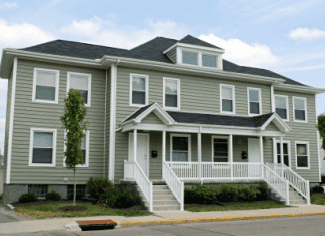5 Key Differences Between Duplex and Townhomes Investing
First time real estate investor or seasoned and want to expand your portfolio?
Duplex’s and townhomes are great for people who aren’t financially prepared enough to purchase a single-family home, yet still want to be a homeowner.
Both of these options offer their advantages, and our aim with this blog is to help you understand the differences between duplex and townhome living.

A duplex is a single residential property split into two distinct living spaces or apartments.
They are typically constructed as mirrored versions of one another.
For investors, it is preferable for the investor to have two streams of income from one rental property.
Duplexes can be easier to finance than large multi-unit properties.
A townhome is where individual units are attached in a row of buildings sharing a common wall.
Every townhouse usually covers several levels and, in contrast to apartments or condos, often comes with a piece of land featuring a front or backyard.
Each unit possesses its own individual entryway and is owned independently.
Now lets get into the differences between a duplex and a townhome for your next investment.
5 Key Differences Between Duplex & Townhome Investing
Duplex & Townhome Investing Difference #1 – Cost & Financing
Although duplexes often have a higher upfront cost compared to townhouses (after all, you’re getting two units in a single transaction), they may present some hidden financial benefits.
Duplexes qualify for residential loans, which offer a better interest rate and terms compared to a townhome, and is a favorite for agents who want duplex for rent.
However, townhomes do offer a lower cost to entry, making them also ideal for real estate investors.
Duplex & Townhome Investing Difference #2 – Rental Income
Duplexes offer you the opportunity to get two streams of income from one property every month.
If you aren’t able to have two residents living at the same time however, your income will take a nosedive as you only have one source of income from the property, you will still need to cover for both.
For townhomes, a vacancy means you get no rental income what so ever.
Keep these two scenarios in mind when choosing your next property.
Get a Free Multifamily Loan Quote
Access Non-Recourse, 10+ Year Fixed, 30-Year Amortization
Duplex & Townhome Investing Difference #3 – Maintenance Fees
As a duplex owner, you will often find yourself needing to play the role of being a handyman.
You fix anything that arises, and keep the property looking nice, inside and outside.
If you opt for a townhome, you could have the benefits of being apart of a homeowners association (HOA).
If you are apart of a HOA, you will need to pay the fees associated with that.
While you are a handyman with a duplex, and apart of an HOA with a townhome, there are positives and negatives with both.
Duplex & Townhome Investing Difference #4 – Ownership
One person holds the ownership of the entire duplex property.
For townhomes, each individual townhome that is connected is not typically owned by the same person.
The essential differences between duplexes and townhouses, in terms of their layout and ownership structure, naturally impact the kind of residents they attract, the rental revenue they can generate, and the opportunities they present for the resale market.
Duplex & Townhome Investing Difference #5 – Investment Risk
The dual-unit configuration of duplexes can offer a safeguard against potential income loss resulting from vacancies.
Should one unit become empty, the other continues to generate income.
Duplexes can also be good for using it as an AirBnB residence.
On the opposite side, when a townhouse becomes vacant, the income stream ceases entirely until a new tenant is secured.
Conclusion
Choosing between duplex and townhouse living will ultimately depend on your financial readiness, investment goals, and personal preferences.
Duplexes provide the stability of two income sources and can be a great option for hosting on platforms like Airbnb, though they demand more hands-on upkeep.
On the other hand, townhouses offer a communal environment and fewer maintenance obligations, but a vacancy results in the total loss of rental revenue.
Source: The Duplex Doctors















 Accessibility
Accessibility